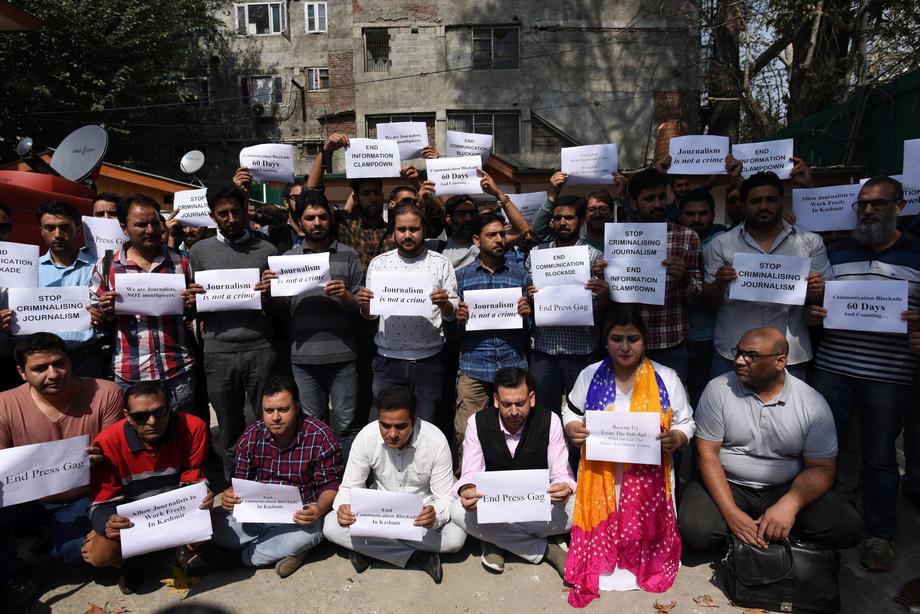The authorities in Jammu and Kashmir should immediately withdraw cases registered against three journalists in the region and end all harassment of the press, the International Press Institute (IPI), a global network of editors, media executives and leading journalists for press freedom, said today.
On April 20, the police in Jammu and Kashmir announced that freelance photojournalist Masrat Zahra had been booked under the Unlawful Activities Prevention Act (UAPA). The draconian Act allows the government to designate individuals as terrorists. The police have claimed that Zahra posted photographs and information to social media that glorify “anti-national activities” that could lead to the disruption of public order.
Another journalist, Peerzada Ashiq, who works for The Hindu newspaper, was summoned by the police over an April 19 report about the family members of two militants who were refused the bodies of their deceased kin. Ashiq was questioned about alleged inaccuracies in the report and a case has been filed against him.
On April 21, journalist and author Gowhar Geelani was booked for “glorifying terrorism”. Police claim they began investigating Geelani after receiving reports that he was “indulging in unlawful activities” deemed “prejudicial to the national integrity, sovereignty and security of India” through his writings on social media. Like Zahra, Geelani, too, has been booked under UAPA.
According to news reports, police issued a statement in which it was stated that only one case had been registered against a journalist for his “journalistic work” as the other two persons were booked for having posted “explicitly seditious, incendiary and incriminating texts on social media”.
“I would describe the situation as grim. The targeting of journalists in Kashmir is happening at a time when the real concern and focus of the government should have been the coronavirus pandemic situation”, Isfaq Tantry, general secretary of the Kashmir Press Club and a senior journalist in Kashmir, told IPI via email. “However, it appears that the government has deliberately chosen this period to target media in Kashmir.”
IPI Deputy Director Scott Griffen reiterated IPI’s grave concern over the state of media freedom in Kashmir.
“Over the past few months, Kashmir has become one of the world’s most repressive spots for the press, with the authorities using arrests, internet shutdowns and surveillance to control the flow of news”, Griffen said. “We urge the government to drop charges against all three recently detained journalists and stop harassing the press.”
Harassment increasing amid COVID-19 pandemic
Meanwhile, the Press Club of India said in a statement that “the Cyber Police appear to be super-active” in the Kashmir region, “parsing every word written and then summoning journalists to the police station”.
“Though in the past too, journalists in Kashmir have been summoned and questioned by the police, the filing of first information reports (FIRs) against them for their journalistic work appears to be the latest trend or tool to target the media in Kashmir”, Isfaq Tantry told IPI.
Besides legal harassment and the monitoring of content of news reports and social media, journalists have also been subjected to physical attacks like beatings since last August. In addition, restrictions on access to high-speed Internet have seriously hampered the work of journalists in Kashmir for several months. Authorities have extended a ban on high-speed mobile Internet until May 11.
Press freedom has been deteriorating in Jammu and Kashmir since August 2019, after the central government revoked Article 370 of the Indian Constitution, which had guaranteed autonomy for the territory. Last month, IPI published a special report on press freedom in Jammu and Kashmir.
